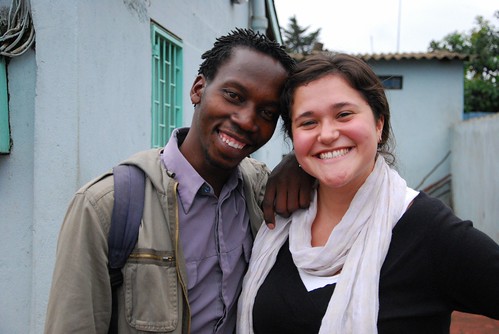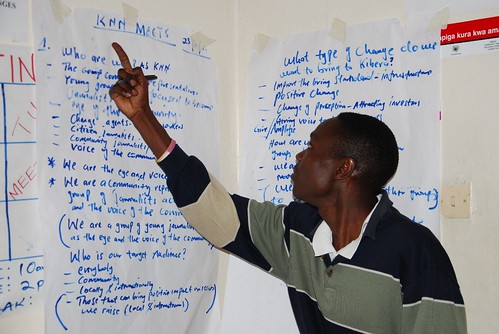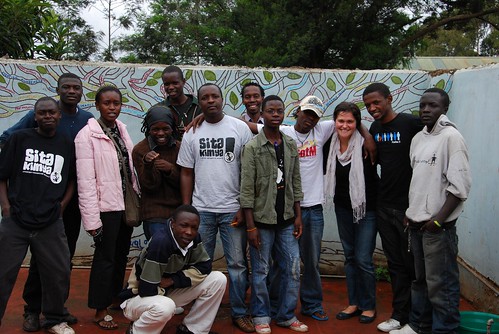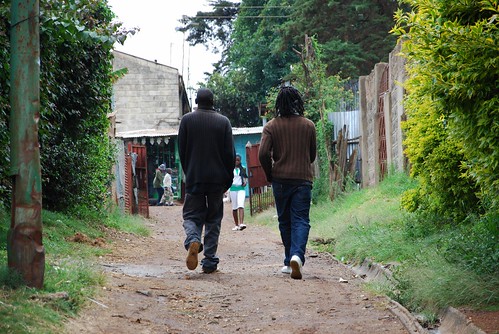Want to read nearly everything Map Kibera got up to in 2010? Our very functional 2010 Year in Review.
2010 in Review
by: mikel February 17th, 2011 comments: 0
Mapping for change – Melinda Gates lauds Map Kibera
by: jamie February 17th, 2011 comments: 0
This is an article prepared by Douglas Namale and published in February 2011 edition of the Kibera Journal. Douglas is a journalist and Editor of the Kibera Journal. He joined Map Kibera in November 2009 to continue contributing to the creation of community information. The article has been posted here with his permission.
—
By Douglas Namale
Melinda Gates has added her voice on the significance of having a map in Kibera as a tool for development.
‘When you map where you stay, it marks the beginning of development’ said Melinda as she addressed delegates at TEDx for Change at Kibera Mchanganyiko hall. She said it’s vital to know how many people live around you since this will form the beginning of lobbying for change. According to her, the mapping project has necessitated many things which majority couldn’t understand without a map.
“Its absurd to note that for many years Kibera has appeared on the map as a forest, till the mapping project which has now revealed different facilities present in Kibera,†she added.
Other delegates voiced their interest in seeing Kibera change. Governance Consultant John Githongo said it’s vital for the state to recognize and value the dignity of its citizenry other than leaving them to despair. Githongo noted that Kenya was quickly turning into a very weak nation polarized by cultural differences and ethnicity something that rendered wananchi vagabonds in their own country.
Bad governance was pointed out as the reason behind the sprawling slums with little attention given to the inhabitants. Salim Mohamed, a budding youth leader and co- founder of Carolina for Kibera blamed NGOs rivalries as one of the reasons behind little development despite 534 NGOs working in Kibera. He pointed out international economic order as a solution to the proliferation of CBOs and NGOs doing almost nothing, despite billions of dollars spent to improve the living standard of people living in Kibera. Mohamed said there was need for NGOs to work together and support each other for any meaningful change to be realized. His sentiments were echoed by Umande Trust CEO, Josiah Omotto. Omotto added that true partnerships and sharing of information will help to mitigate key issues bedeviling the Nairobi slum. He too pointed on bad governance, corruption and lack of transparency and accountability as factors leading to the spread of the slum.
Map Kibera has just embarked on the use of the map to develop the Kibera slum. Already, the team has started up a conversation with the City Council of Nairobi and Kibera Councilors on the need to identify map and name the roads in Kibera. This will make sure that the slum is accessible during emergencies like fire and sickness.
Already, some progress has been made. Among the five councilors representing Kibera at city hall, four have already showed interest and one has already linked us with District commissioner’s office and another NGO interested in building sanitation blocks in Kibera.
Guest Blogger: Wanda O’Brien, Volunteer Trainer with KNN
by: Erica January 6th, 2011 comments: 0
Wanda O’Brien volunteers with Map Kibera in her spare time, while working as a Research and Communications Fellow at the Aga Khan University, Graduate School of Media and Communications in Nairobi. We asked her to write about her experience so far, and here’s what she reported!
It was a Saturday morning, and light filtered through the window curtains illuminating people sitting on a couch, chairs, some perched on the countertop all roughly circling a table in the middle of the room.
On my first meeting with the Kibera News Network (KNN) journalists I asked the young reporters crowded into the workspace near Chief’s Camp to answer three questions:
What do you want to learn during the workshops?
What is a story you have worked on that you found exceptionally challenging or one you are very proud of?
Why are you a journalist?
This was a pre-meeting before I began Saturday reporting workshops for the month of November. The journalists had previous training on videography and filming, but wanted more training on specific reporting skills. Trying to ascertain what I could offer in a classroom environment and the level of journalism experience in the room, after introducing myself, I asked the above three questions and we all listened and discussed what was said for rest of the morning.
QUESTION 1
What do you want to learn during the workshops?
Reporting training topics broached included journalism professionalism, finding story ideas, effectively using voice for VO (voice-overs), TV stand-ups, and interviewing techniques, to name a few. More than enough content to go beyond our originally planned four weeks together! After I asked about story structure, types of news stories, and media law a plan materialized of the direction our sessions would take.
QUESTION 2
What is a story you have worked on that you found exceptionally challenging or one you are very proud of?
Stories about covering events for HIV/AIDS, road infrastructure, and mud slides involving death in the community. The typical challenges of being a reporter, compounded by the role of KNN as a group of Kiberan journalists and residents reporting stories the mainstream media does not.
QUESTION 3
Why are you a journalist?
The answers to Question 3 spoke to the young journalist in me who ventured to J-school after high school not knowing what to expect.
Individuals talked about business opportunities and career potential by having a marketable skill set. However, threaded throughout the business prospects a collective passion for the craft was individually voiced. That through journalism, through story-telling, a community documents and displays its realities with the potential to grow and develop.
Several of the journalists seated in the room with me said they practiced journalism because of its capacity to facilitate change. And they want to be instrumental in creating positive change in Kibera.
You can’t teach that.
The Saturdays in November sped by with workshops covering journalism professionalism, the elements of news, interviewing, media law and ethics, story ideas and story structure. It was a pleasure to work with and discuss journalism techniques and expectations with the group. Utilizing the skills, ideas, and passions within the group, I am excited to see what stories will be produced next, continue working with the team, and follow how the Kibera News Network develops in 2011.



